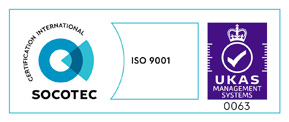
Science-Based Targets Initiative Adjusts Qualification Criteria
27th November 2023
Great news for SMEs – the gold standard for sustainability just became more accessible. The Science-Based Targets Initiative (SBTi) announced an update changing its definition of small and medium sized enterprises that qualify for the SME target validation route. This change is part of SBTi’s aim to promote sustainability and align with European sustainability reporting (Corporate Sustainability Reporting Directive), as well as encourage SMEs to be ambitious with their corporate sustainability goals.
If your business isn’t classed as an SME, but you’re curious about the benefits of sustainability, setting a Science-Based Target is a great way to get started on the right foot, and show your customers and employees that you’re serious about carbon reduction.
If your business has already set Science-Based Targets, that’s fantastic news – but there is still more to discuss. As businesses whose Scope 3 Emissions encompass more than 40% of their overall Carbon Footprint are required to set a Scope 3 goal within their targets, it’s likely your organisation will be required to set a Scope 3 SBT (Scope 3 Emissions contribute to over 70% of carbon emissions for 70% of all businesses). As Scope 3 incorporates your Value Chain, it’s time to begin tackling those upstream and downstream emissions, as well as communicating with suppliers about their emissions profiles and the benefits of setting their own targets.
What are the new SBTi SME changes?
Within the new guidance, a company will be considered an SME if all the below points are met:
- Have <10,000 tCO2e across scope 1 and location-based scope 2 emissions.
- Do not own or control maritime transport vessels.
- Do not own or control power generation assets.
- Are not classified in the Financial Institution (FI) Sector or Oil & Gas (O&G) Sector.
- Are not a subsidiary of a parent company whose combined businesses fall into the standard validation route.
In addition to two of the below:
- Employ <250 employees.*
- Turnover of <€40 million* (£35 million).
- Total assets of <€20 million* (£17 million).
- Are not in a mandatory Forest, Land and Agriculture (FLAG) sector.
These updates will come into effect on 1st January 2024.
How can SMEs benefit from Science-Based Targets?
Science-Based Target setting has plenty of benefits. SBTs can help your organisation to:
- Improve business reputation
- Support sectoral decarbonisation
- Complement existing net zero and wider sustainability strategies
SMEs play a crucial role in decarbonisation and corporate climate action. Setting targets to the Science-Based Target standard is an excellent way for small- and medium-sized businesses to focus on practicality and best practice while remaining ambitious about sustainability.
If you are a Small- and Medium-Sized Business (SME), it’s never been easier for your organisation to commit to sustainability by setting and validating a Science-Based Target. The GEP Environmental team can support your organisation to set Science-Based Targets through our Streamlined SME Approach, which includes:
- Assistance developing a GHG baseline and Carbon Footprint (Scope 1, 2 and 3 emissions).
- Assistance completing the SBTi’s SME Target Validation System.
- Specialist advice and support in setting near-term and net-zero targets.
- Assistance throughout the validation process (answering technical queries, updating Carbon Footprint, supporting information as required).
Curious about the positive impact that Science-Based Targets could have on your organisation? For more information about how your team could adhere to the sustainability gold standard, get in touch today.
*Aligned to the European Union’s Corporate Sustainability Reporting Directive (CSRD) SME criteria
< Back to all News
Would you like a free call-back from one of our Consultants?
Simply click the button below and one of our team will be in touch
Request a call-back
